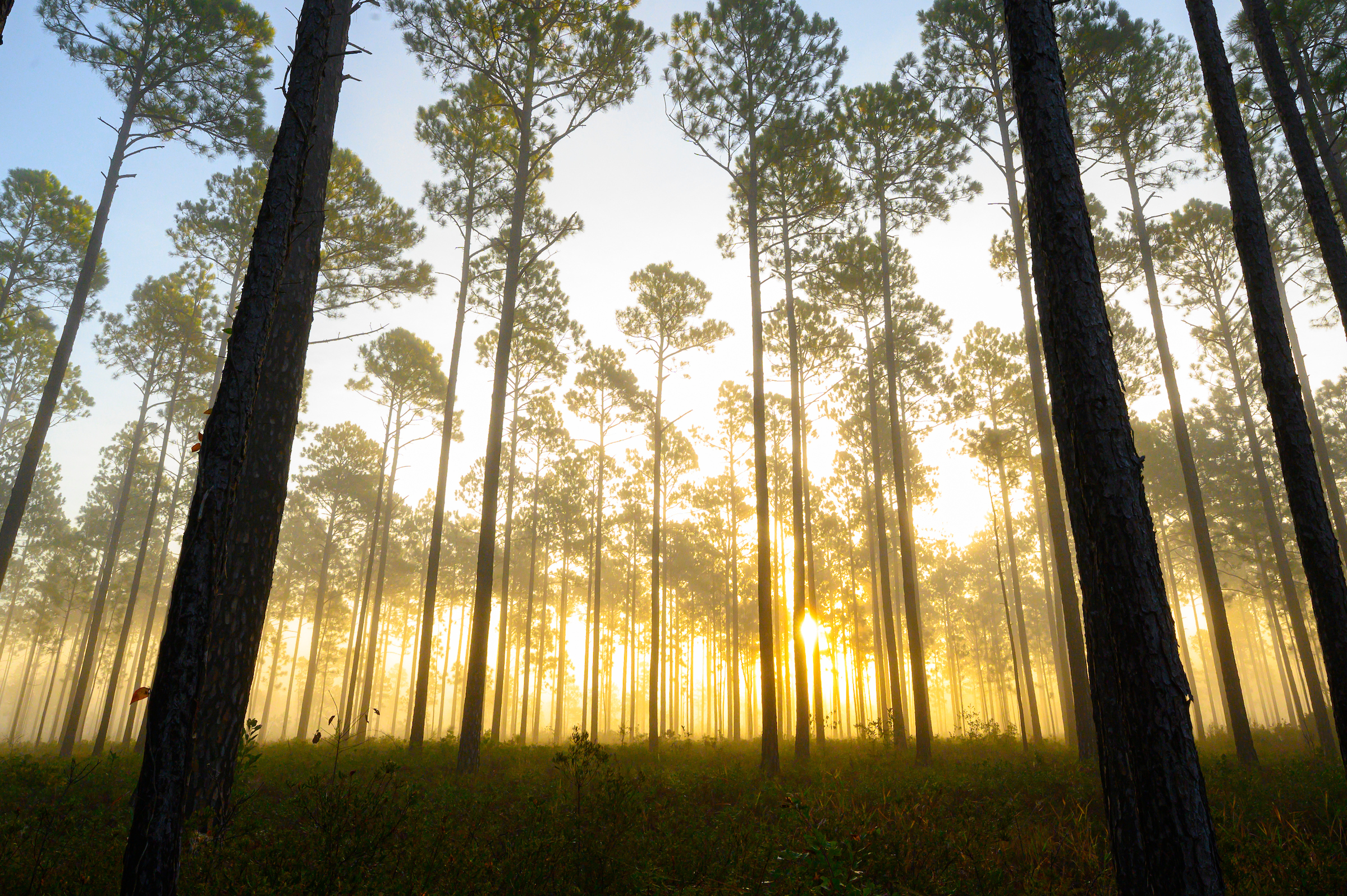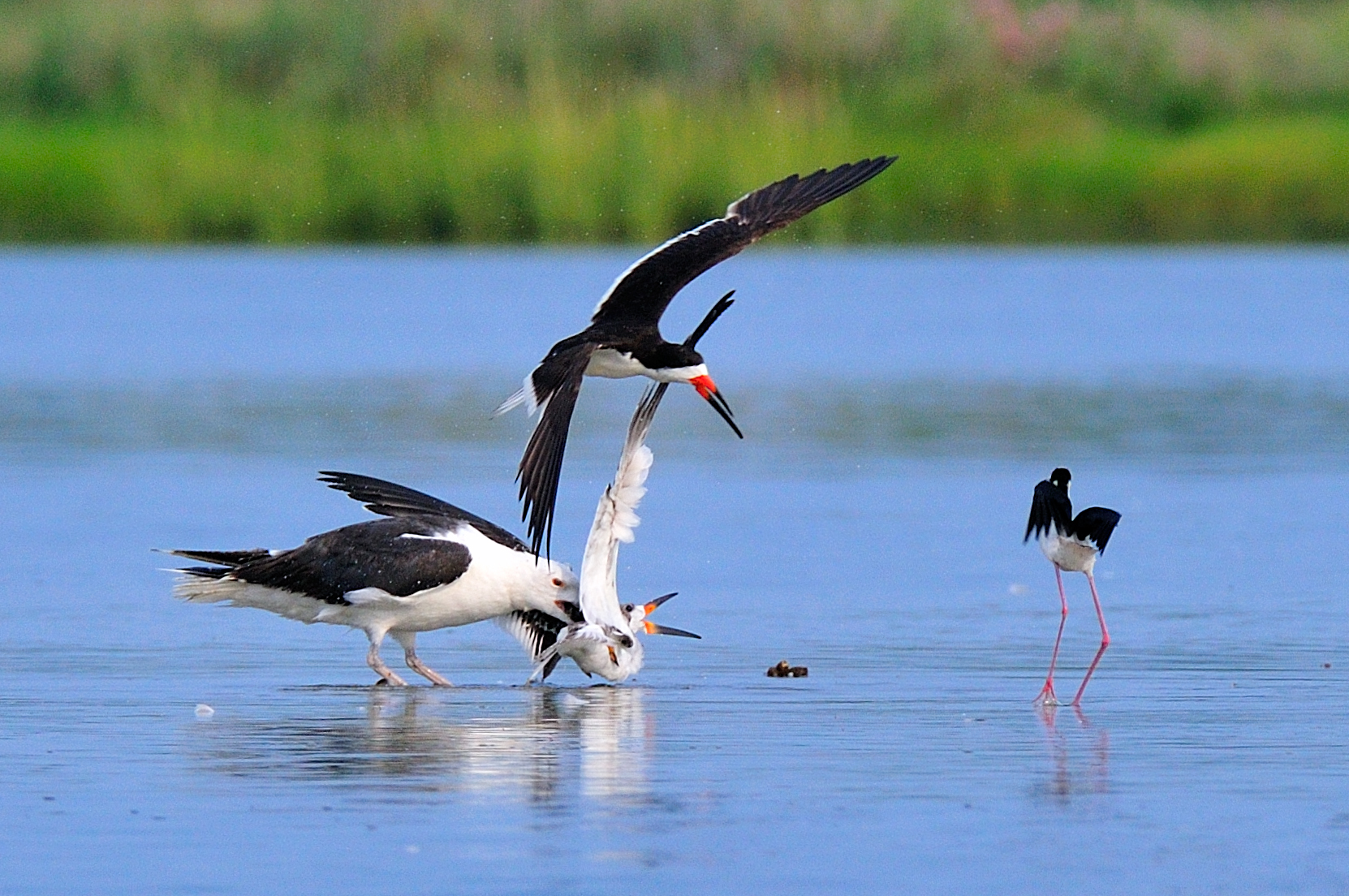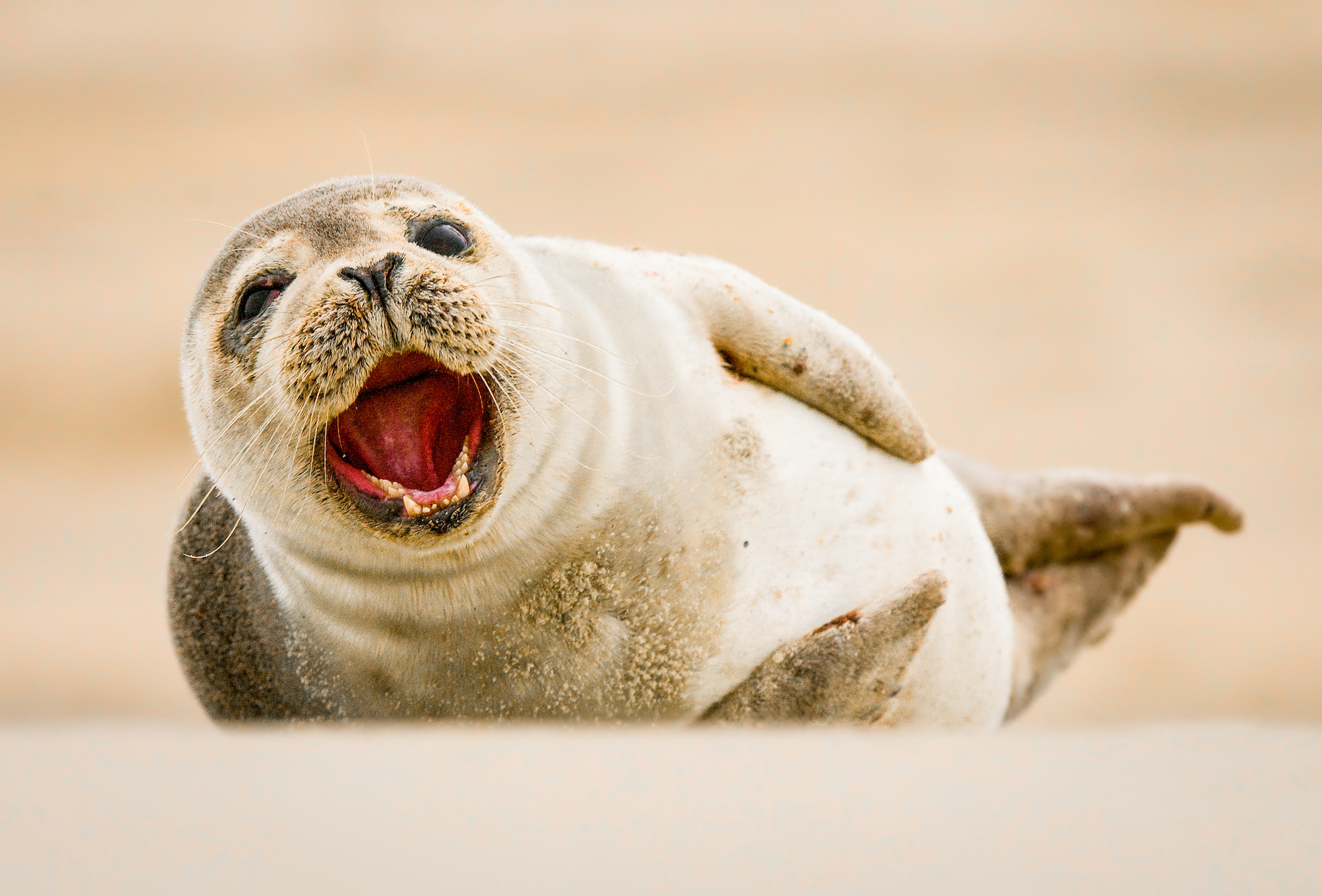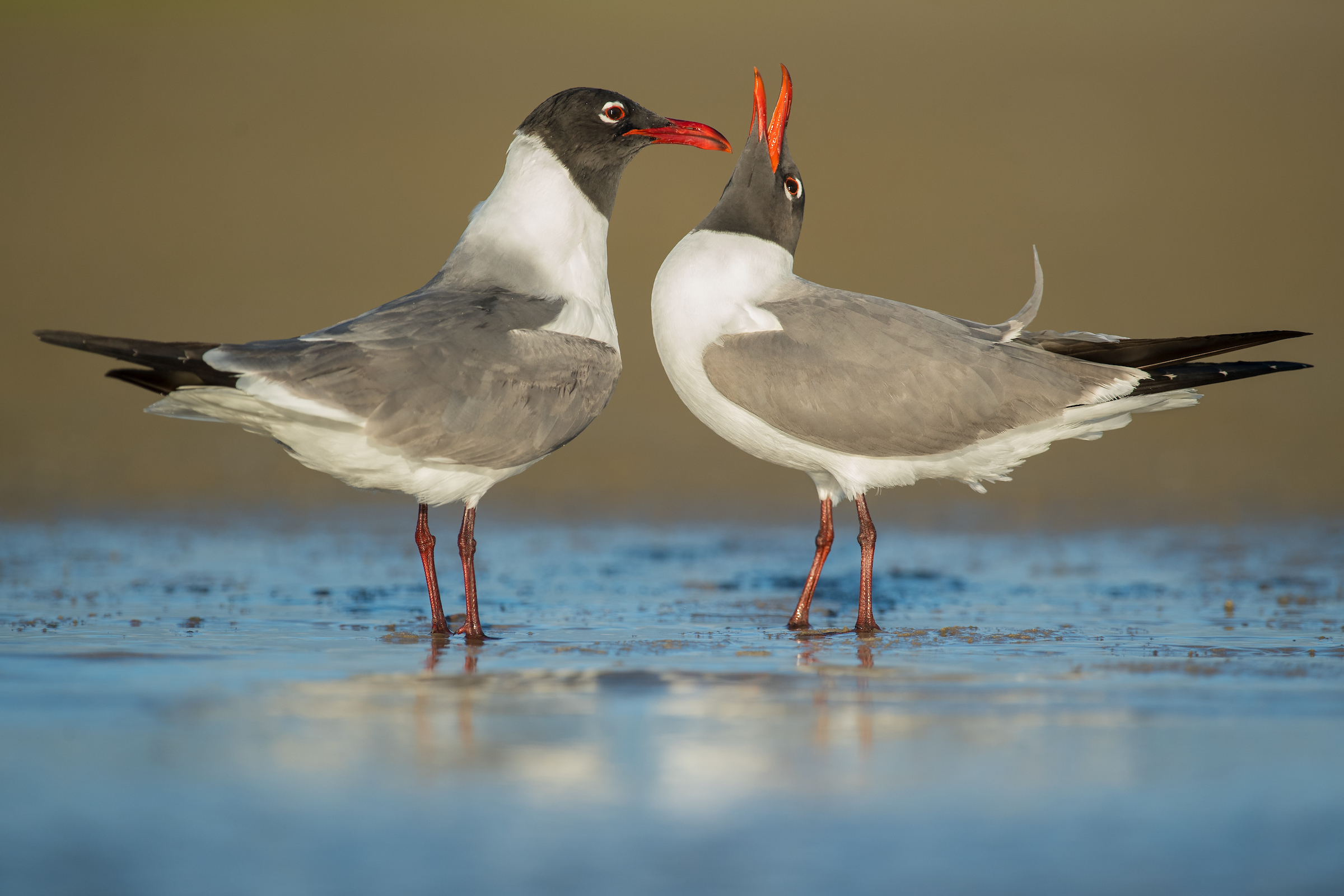
The sun rises over an old-growth forest in the Green Swamp Preserve in Brunswick County. A single meter of ground in the Green Swamp has more species of plants growing in it than any other place in the world. Photo: Jared Lloyd
Alienation: the state or experience of being isolated from a group to which one should belong, or in which one should be involved. Estrangement.
I’m on the winter beach, wide, flat and cold. Cobalt-blue skies reign overhead. A biting wind rushes in from the northwest.
It’s all so different up here on the northern Outer Banks, compared to the southern islands. The Labrador current and cold-slope waters create a dramatically different climate here, compared to those sandbars governed by the Gulf Stream. Seals will be showing up again soon enough. Mostly young harbor seals, but a few fat greys and even some harps, if we are lucky.
The New England blues have already made it to town, and I can only assume stripers are in their mix. I’ve watched a parade of humpback whales migrating south past this beach for a month now already, their dark, shadowy masses drawing in birds for miles around, occasionally rolling over to lift a great wing of a fin out of the sea like a friendly neighbor waving hello, or goodbye, or maybe just flipping me the bird.
Flip-flops hang from my feet as I sit on my tailgate. I could tell you this is by design, that my choice of footwear was a personal form of protest against the changing season. Or I could say that flip-flops have always been the official footwear of philosophical thinking. Just ask Plato, if you don’t believe me. But let’s be honest here: They were sitting by the door and, well, that was easy.
Seeing me with a pair of binoculars in hand, an SUV pulls up and the windows roll down.
“Is it a whale?” the man asks.
His kids lean forward from the backseat, scrambling to peer out the starboard side window toward the ocean, hoping to see what I see.
“No sir. Gannets and great black-backed gulls over the outer bar,” I reply.
“Birds? Who cares about stupid sea gulls!?”
The kids laugh. He laughs. His wife laughs. They drive away and I just stare.
When I look out over the ocean, I don’t see “stupid birds.” I see northern gannets, an elegance I wait all year to return. Gannets are the lords of the wind in the northern Atlantic, more albatross than not, with 6-foot wingspans. Here, along the Outer Banks, they will at times gather into flocks by the hundreds of thousands during the winter to create a giant white squall of birds that fills the horizon. The noise of nearly half a million strong is deafening. The never-ending cycle of birds falling from the sky and lifting off again is hypnotic.
Tipping over mid-air, some 150 feet above the ocean, a gannet pulls back her wings and thrusts out her neck as she begins to plummet toward the sea. She becomes like a lightning bolt hurled by Zeus toward Earth.
Now, imagine tens of thousands of these birds all piercing the water simultaneously like arrows loosed from the heavens. You know that moment in movies where the archers along the castle walls collectively fire their first barrage of arrows into the sky? That moment when time stands still, when the music stops, when all eyes are on the impossibility of the thing? That’s what it’s like watching a white squall of gannets when they have found big shoals of herring.
No. I don’t see stupid birds, I see great black-backed gulls – one of the greatest avian predators that patrols our coastlines in the winter. I have watched these birds snatch puffins out of the air to our north. I have watched these hunters catch black skimmers in Oregon Inlet, the fighter jets of our coast with 4-foot-wingspans, and pick them clean in minutes. Wolves with wings they are.

A great black-backed gull attacks a juvenile black skimmer as an adult skimmer and black necked stilt attempt to ward him off. Photo: Jared Lloyd
Whereas most beachgoers think of gulls as little more than a bird that begs for French fries and potato chips, the great black-backed gull is the species that would fly over, snap the neck of that begging gull, and proceed to rip it to pieces at the edge of your beach towel while you and your children looked on in horror.
Staring out over the sea, I see familiar faces. I see stories.
Of course, the family of tourists on the beach know nothing of these stories. But what if they did know? Would they still see “stupid birds?” Would they look out and find themselves captivated by the swirling vortex of evolution that hangs in the air above the ocean before me? And if they did see THIS instead of “stupid birds,” would that change the way they saw or thought about other things?
Would it change the way they made decisions if they knew those decisions affected those birds?
Botanists speak of what they call plant blindness in our culture. We hurry about our lives never actually seeing the rich tapestry of plant biodiversity all around us. If people see anything, it’s as simple as grass, or trees, or maybe flowers – but only if they are large and brightly colored.
Do people realize North Carolina has more species of orchids than any other state in our country except for Florida? Or that one single meter of ground in the Green Swamp has more species of plants growing in it than any other place in the world? Do we know that one quarter of all modern medicine is derived from plants, and that many of these plants grow in our own backyards?
Or more to the point, do we know the life history of yaupon holly? How that it contains caffeine, how that it was consumed as a social drink for thousands of years like coffee is today, how that it may have been the foundation of Native transcontinental trade networks that reached from the Atlantic to the Pacific, how that it completely replaced “tea” after the Boston Tea Party for a while, and that it is a common shrub growing all over the coastal plain from Virginia to Texas?
Probably not. They’re just plants.
But what if you did know about yaupon holly? Would this knowing change the way you looked at it? Would you have an altogether different experience when you noticed one of these growing at the edge of your yard? What if you had warmed you belly with a steaming cup of its “Carolina tea,” would that create familiarity and make it more than just some “stupid plant?”
And if this did make a difference, could the same thing be said for other plants, insects, birds, or amphibians?
The problem at hand is bigger than plant blindness. It’s a blindness toward everything around us that is not us. It’s nature blindness. And it comes at the cost of alienating us from every other living thing on the planet.
From the perspective of psychology, alienation creates the feelings of isolation and disconnectedness. It creates the sense of powerlessness and of meaninglessness. It creates a longing for real relationships. And this experience paves the way toward the darkness of mental illness.
It’s fascinating how long we have been beating around this bush – no pun intended. Jews and Christians alike acknowledged this alienation as punishment for original sins, when humans were cast from the Garden of Eden. Karl Marx claimed that instead of spiritual downfall, it was capitalism that alienated us from nature by reducing the natural world to nothing more than commodities to be bought or sold.
In “Civilization and its Discontents,” Sigmund Freud offered up his own take on the matter, suggesting that this great big experiment of civilization itself was the root cause of so much mental illness due to the alienation it created. For more than 2,000 years, we have stared the problem in the face, shrugged our shoulders and then neurotically went on with busying ourselves with whatever we busy ourselves.
When someone becomes disconnected from their community, from their neighbors, their loved ones for long enough, they begin to normalize the experience. Their baseline for reality shifts. Their worldview shifts. The prefrontal cortex begins to shrink, and the amygdala begins to enlarge. They lose critical thinking while gaining emotional reactionism. Their situation becomes rationalized in some way. And the person turns further inward. Interest in community dissolves.
Studies done in regard to social alienation in mammals – that is to say, people, mice, dolphins – reveal grave consequences. We see an increase in aggression toward the unfamiliar, persistent fear and hypersensitivity toward threatening stimuli.
Does this all sound vaguely familiar? Fear of wolves. Fear of snakes. Fear of sharks. Fear of storms. Fear of nature encroaching, of trees falling, of weeds strangling, of getting lost in the woods, of rabies from racoons. Hatred of coyotes. Hatred of great horned owls. Hatred of gulls. Hatred of everything around us that is not us.
Aldo Leopold once said that there were two inherent dangers in not owning a farm. The first was assuming that food came from grocery stores, and the second was that heat came from a furnace. Owning a farm means working closely with the land and its other inhabitants. This demands that, at least on some level, there becomes a familiarity with the systems you are working within. Sometimes these systems are a simple as cause and effect: “If I fell a tree and cut wood today, I can warm my shins this winter.” Other times those systems are more complex. And if we are not exposed to these things, how are we to know they even exist?
Take salamanders for instance. North Carolina plays home to more species of salamanders than any place else, and yet most have no idea the importance of the salamanders here to the entire world. Sometimes we struggle to understand the importance of a thing do its scale in comparison with ourselves. Salamanders fit this bill.
Despite their size, despite their secretive nature, salamanders are actually apex predators in the ecosystem. Although they might not take down a whitetail deer anytime soon, each salamander consumes around 20 insects a day. So veracious are these amphibians that they have been dubbed the wolves of the forest floor by some researchers.
Twenty insects might not sound like much, but when those numbers are extrapolated for the estimated number of salamanders in a given area, this is tremendous. Especially in terms of carbon sequestering.
A large chunk of the carbon that is emitted into the atmosphere is taken up by trees. Trees shed their leaves throughout the year and that falls to the ground with those leaves and slowly becomes part of the soil. That is unless a host of different insects feed on those leaves and release that carbon back into the atmosphere. This is where salamanders and their 20-bug-a-day diet comes into play.
It all sounds so small, so insignificant – again, from the perspective of us and the size of our diets. But just like the impacts that our daily lives have on the world, we can measure the amount of carbon that a single salamander is ultimately responsible for keeping in the soil. When such numbers are scaled to account for the estimated population of salamanders, we find that these little creatures have such a large impact on carbon cycles that they actually help to regulate global climate. Remove salamanders and carbon dioxide levels would increase.
All this from a salamander.
Will you ever be able to look at one the same way again?
Experiencing and engaging with the natural world is only the first part of the equation. We have to know the world in which we live as well. Without this knowing, it’s like living in a neighborhood where you see your neighbors everyday but have never so much as stopped to talk to them. What would life be like living next to people for so many decades and never getting to know them?
There is a reason we surround ourselves with dogs and cats and house plants. We have an innate need for connection with the natural world. But it is not until we allow our minds to move beyond the confines of our own homes and begin to come to know the native denizens of our community will we ever truly feel at home in a place.
And maybe this is the point of it all. Feeling at home.
Do you care about your house? Do you long to upgrade your kitchen? Do you fix the roof when it leaks? Do you take the trash out and vacuum and dust? Do you take pride in where you live?
Of course you do. This is your home. You feel a responsibility to care for it, to keep it up.
Can you imagine what would happen if we began to truly see and know the forest and beaches and coastline and estuaries as our home?
Like This Story?
It costs about $500 to produce this and all other stories on CRO. You can help pay some of the cost by sponsoring a day on CRO for as little as $100 or by donating any amount you're comfortable with. All sponsorships and donations are tax-deductible.
"really" - Google News
November 06, 2020 at 12:16PM
https://ift.tt/36dqmXx
Alienation: Are You Really at Home? - Coastal Review Online
"really" - Google News
https://ift.tt/3b3YJ3H
https://ift.tt/35qAk7d
Bagikan Berita Ini
















0 Response to "Alienation: Are You Really at Home? - Coastal Review Online"
Post a Comment